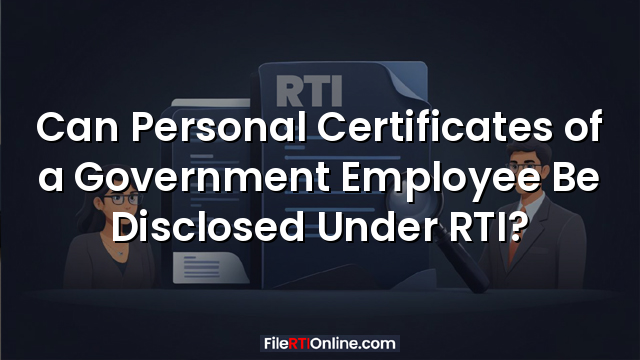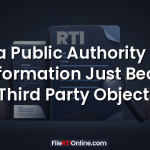Can Personal Certificates of a Government Employee Be Disclosed Under RTI?
Understanding What Information Is Public and What Is Truly Personal
One of the most debated topics under the Right to Information Act, 2005 is whether documents submitted government employee at the time of appointment—such as educational certificates, caste certificates, or residence certificates—can be accessed RTI applicant.
Public authorities often reject such requests Section 8(1)(j) of the RTI Act, arguing that these are “personal details” of the employee. However, recent decisions of the Central Information Commission (CIC) clarify that not everything submitted in the recruitment process is private.
In this article, we break down the legal position and examine a real CIC case involving the National Aluminium Company Ltd. (NALCO) to understand how such requests are handled and what information can be disclosed.
Why This Question Matters
Recruitments in public authorities are part of a transparent, statutory process. Qualifications, category benefits, and eligibility criteria directly affect:
- Who gets selected
- Whether the selection was fair
- Whether public resources were properly utilized
Therefore, documents forming the basis of such appointments often hold public importance.
What the RTI Act Says About “Personal Information”
Section 8(1)(j) protects information that:
- Is personal in nature
- Has no relationship to public activity or public interest
- Would cause an unwarranted invasion of privacy
However, when information is connected with public employment, the definition of “personal” changes substantially.
Documents that determine eligibility for a public post are part of a public activity and directly related to transparency in governance.
Case Study: CIC Decision in the NALCO Employee Information Request
Background of the Case
An RTI applicant sought the following from NALCO:
- Date of posting and present designation of a specific employee
- Copies of educational certificate
- Caste certificate
- Residence certificate submitted at the time of appointment
The Public Information Officer denied the request, labeling all documents as personal and exempt under Section 8(1)(j).
CIC’s Analysis and Decision
The Central Information Commission held that:
- Not all documents submitted during appointment are “personal.”
Certificates that establish eligibility for recruitment are directly related to public activity. - Educational, caste, and residence certificates form the basis of appointment, and therefore cannot be treated as private.
- The PIO must disclose:
- Date of first posting
- Current post/designation
- Copies of educational, caste, and residence certificates
The CIC concluded that such information is disclosable because it is essential for ensuring transparency in public recruitment.
What Employment-Related Information Can Be Disclosed Under RTI?
Based on CIC rulings and legal principles, the following documents are generally disclosable:
1. Educational qualifications required for eligibility
These establish whether a person met the criteria for the government job.
2. Caste certificates (when reservation benefits were claimed)
Since reservation is a public policy mechanism, such documents are part of public scrutiny.
3. Residence or domicile certificates submitted during recruitment
If the job required specific domicile status, these are relevant to the selection process.
4. Service-related information
Postings, transfers, designations, and records related to official duties.
These documents have direct relevance to public employment and cannot be withheld as “personal.”
What Information May Still Be Exempt?
The RTI Act continues to protect genuinely private information, such as:
- Medical records
- Family details not linked to eligibility
- Bank or salary account numbers
- PAN, Aadhaar, financial identifiers
- Confidential performance appraisals
These are not related to the public activity of recruitment and are generally exempt unless larger public interest is proven.
Why This Matters for Transparency
Disclosing eligibility-related documents enhances:
- Public confidence in government recruitment
- Accountability in appointments
- Prevention of fraud, impersonation, or misuse of reservation benefits
The NALCO case reinforces that public employment cannot be shielded behind blanket claims of privacy.
Final Takeaway
Personal information fully disconnected from public activity is undoubtedly protected. But documents forming the basis of a public appointment are not private and fall within the scope of disclosure under the RTI Act.
The CIC’s decision clearly establishes that transparency in public recruitment outweighs generic privacy arguments. Applicants are entitled to know whether a public authority followed due process while appointing an employee, and RTI remains one of the most powerful tools for ensuring this accountability.


